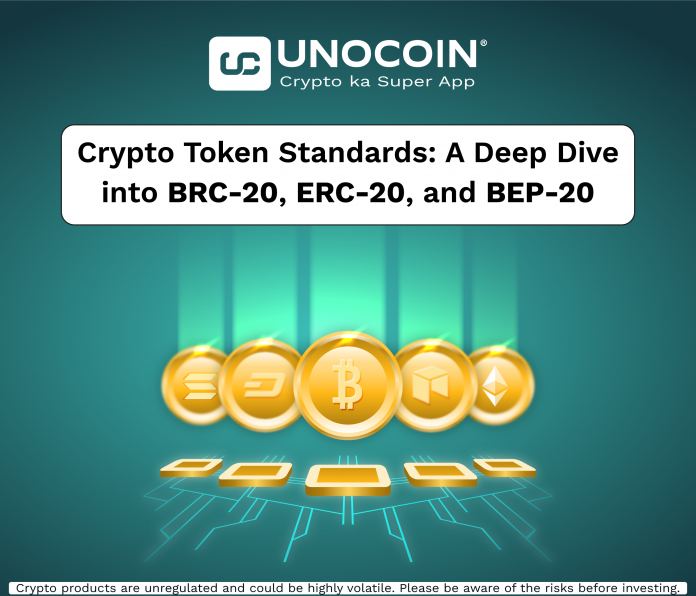Introduction:
Crypto token standards have played a vital role in the widespread adoption and interoperability of blockchain-based assets. In this article, we will explore three major token standards: BRC-20, ERC-20, and BEP-20. Each standard represents a unique set of rules and features that govern tokens on different blockchain networks, namely Bitcoin Network (BRC-20), Ethereum Network (ERC-20) and Binance Smart Chain (BEP-20).
BRC-20 Tokens:
BRC-20 tokens are tokens that work on the Bitcoin network. This token standard is similar in concept to ERC-20 and BEP-20 and provides a framework for creating and managing tokens. BRC-20 tokens allow developers to build applications and smart contracts on the Bitcoin blockchain, opening up possibilities for tokenization in the Bitcoin ecosystem. While not as widely adopted as ERC-20 or BEP-20 tokens, BRC-20 tokens offer a unique tokenization solution for the Bitcoin community.
ERC-20 Tokens:
ERC-20 tokens are the most widespread and widely used token standard on the Ethereum network. This standard revolutionized the token economy, allowing the creation of fungible tokens with a consistent set of functions and properties. ERC-20 tokens provide seamless integration with various Ethereum-based applications, wallets, and exchanges. Their interoperability has fueled the growth of decentralized finance (DeFi), initial coin offerings (ICOs) and the wider Ethereum ecosystem. ERC-20 tokens offer features such as token transfer, balance checking, and token transfer approval, making them versatile and widely used.
BEP-20 tokens:
BEP-20 tokens are tokens that run on the Binance Smart Chain (BSC), which is compatible with the Ethereum Virtual Machine (EVM). BEP-20 tokens mirror the functionality of ERC-20 tokens, enabling seamless migration and interoperability between the BSC and Ethereum networks. With lower transaction fees and faster confirmation times compared to Ethereum, BEP-20 tokens have gained significant traction within the Binance Smart Chain ecosystem. They are commonly used for DeFi applications, decentralized exchanges (DEX) and other blockchain-based services on the BSC network.
Comparison of standards:
While all three token standards serve to create and manage tokens on their respective blockchain networks, there are some key differences to consider. BRC-20 tokens are specific to the Bitcoin network and offer tokenization opportunities within that ecosystem. ERC-20 tokens, on the other hand, are synonymous with the Ethereum network and have the widest acceptance and compatibility. Built on the Binance Smart Chain, BEP-20 tokens provide an alternative for developers looking for a more cost-effective and faster transaction experience compared to Ethereum.
Conclusion:
Crypto token standards such as BRC-20, ERC-20, and BEP-20 have played a key role in the tokenization of assets and the growth of blockchain ecosystems. While ERC-20 tokens have become an industry standard offering extensive interoperability and widespread adoption, BRC-20 tokens serve the Bitcoin community and BEP-20 tokens represent an alternative to the Binance smart chain. As blockchain technology continues to evolve, we can expect more token standards to emerge to address the unique needs of different networks and communities.
Please find the list of authentic Unocoin accounts for all your queries below:
- YouTube Channel: https://www.youtube.com/c/Unocoin/videos
- Newsletter: https://medium.com/subscribe/@Unocoin_growth
- Blogs: https://blog.unocoin.com
- Instagram: https://www.instagram.com/unocoin/
- Twitter: https://twitter.com/Unocoin
- Facebook: https://www.facebook.com/unocoin/
- LinkedIn: https://in.linkedin.com/company/unocoin
- Telegram Group: https://t.me/Unocoin_Group
- Telegram Channel: https://t.me/+fasQhTKBsfA5N2Zl
- Telegram: https://t.me/UnocoinSupport_Bot
- E-mail id: [email protected]
- Contact details: 7788978910 (09:30 AM IST – 06:30 PM, Mon – Sat)
- App store link: https://apps.apple.com/us/app/unocoin/id1030422972?ls=1
- Playstore link: https://play.google.com/store/apps/details?id=com.unocoin.unocoinwallet
Disclaimer: Crypto products are unregulated as of this date in India. They could be highly volatile. At Unocoin, we understand that there is a need to protect consumer interests as this form of trading and investment has risks that consumers may not be aware of. To ensure that consumers who deal in crypto products are not misled, they are advised to DYOR (Do Your Own Research).




